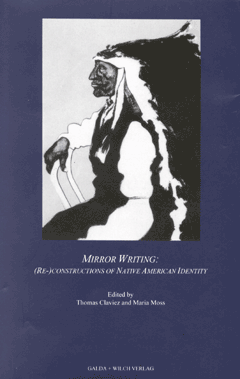Mirror Writing: (Re-)Constructions of Native American Identity
Thomas Claviez/Maria Moss (eds.)
Mirror Writing: (Re-)Constructions of Native American Identity
(Madison: Galda+Wilch, 2000)
In this collection of articles, scholars from four different countries (Canada, the U.S., England, and Germany) debate in sometimes very personal accounts historically charged misconceptions of Native Americans: from the “cruel” to the “noble savage,” from the political issue of a “nation within a nation” to the esoteric transfigurations of a life with and in nature, from the Western preference for written works to the native adherence to oral traditions. How to “bridge” the gaps involved between exploitation and romanticization, between projection and experience, between an isolationist nationalism and a rather noncommital postmodernism (and the dangers involved in both), and between viewing Native Americans as objects of research or equal subjects in a common attempt to understand is the problem that informs the contributions here collected.
On the one hand, the essays confess the historical embeddedness of Western categories, on the other, they insist - from different perspectives and through different approaches - that the identification of “otherness” engages not only questions of knowledge, but of ethical acknowledgment. Together, they celebrate a form of “cosmopolitanism” that, in the long run, should not remain simply one “approach” among many, but should inform scholarship as a whole.
Contents:
Notes on Contributors
Introduction
PETER BOLZ
The Lakota Sun Dance Between 1883 and 1997: The Outlawing and Revival of a Cultural Symbol
KARIN BERNING
The Messenger Feast: Myth and Cultural Identity
HANS-ULRICH SANNER
Confessions of the Last Hopi Fieldworker
MARIN TRENK
“White Indians” and “Red Euro-Americans”: Crossing Cultural Boundaries in Colonial
CHRISTIAN F. FEEST
DOMINIQUE LEGROS
First Nation Postmodern Cultures: (Re-)Constructing the (De-)Constructed and Celebrating the Changes
JULIE CRUIKSHANK
The Social Life of Texts: Keeping Traditions “Oral” in a Time of Textual Studies
THOMAS CLAVIEZ
Narrating Environmental Ethics: N. Scott Momaday and Walter Benjamin
MARIA MOSS
The Achilles’ Heel of Absolute Power: Narrative Survival Strategies in Native American Literature
Nationalism, Indigenism, Cosmopolitanism: Three Critical Positions on Native American Literatures
DAVID MURRAY
Cultural Sovereignty and the Hauntology of American Identity
MICK GIDLEY
Reflecting Cultural Identity in Modern American Indian Photography
Index
Review Excerpts:
“Mirror Writing collects historical and current (mis-) representations of North American indigenous identity, sketches the multiple perspectives on the Other as Other, and contains proposals for a change of those perspectives in order to achieve a respectful approach toward Native American culture. The participating scholars refer to, and their contributions complement each other, thus constructing a (mirror-)image of the Other that faces the reader. A stimulating and commendable book that focuses on understanding and comprehending a foreign culture.”
Claudia Rapp, Zeitschrift für Kanada-Studien
“The collection overall makes an important contribution to the field of Native American studies. For students of Native American literature, the essays on oral and written traditions are certainly worth perusing. Yet the most valuable contributions made by this collection are those essays which engage significant questions about the ethics and purposes of Native American studies.”
Ernest Stromberg, Studies in American Indian Literature
“The essays in Mirror Writing offer a much-needed contribution to Native American studies. Carefully selected and edited, they provide an examination of the various ways that Western scholars have studied Native Americans in the past and suggest ways in the future that scholars might better approach native cultures by acknowledging the inherent biases and ethnocentric blind spots any such study contains.”
Charles L. P. Silet, Journal of American History
“The present collection … ís a thoughtful attempt to present reasonable views on how anthropologists should approach Native Americans, and how to defend anthropology against the sometimes unfair attacks of its critics. Another asset of the book are the rich bibliographies for each of the essays, which may provide inspiration for further rewarding and enjoyable reading.”
Bartosz Hlebowicz, Native American Studies
… “mirror writing/criticism” could be a new concept of seeing and reading, one that is aware of the mirror as mirror, uncovers its images as projections, denies authenticity claims, and uses the benefits of self-scrutiny to point beyond the image. A multiplicity of different mirrors, positioned at different angles, may not only allow “readers” to see themselves from unfamiliar perspectives but also open unexpected views at the world. In its consistent celebration of variety and pluralism, Mirror Writing meets precisely this challenge of critical dialogue and completely lives up to its title’s promise.”
Birgit Däwes, Amerikastudien/American Studies
